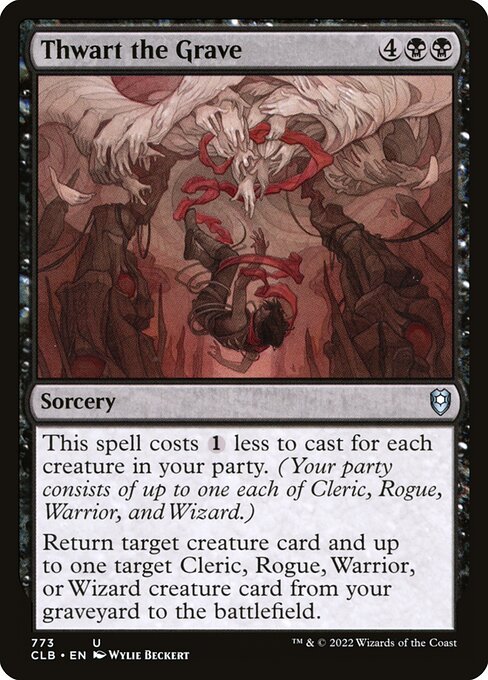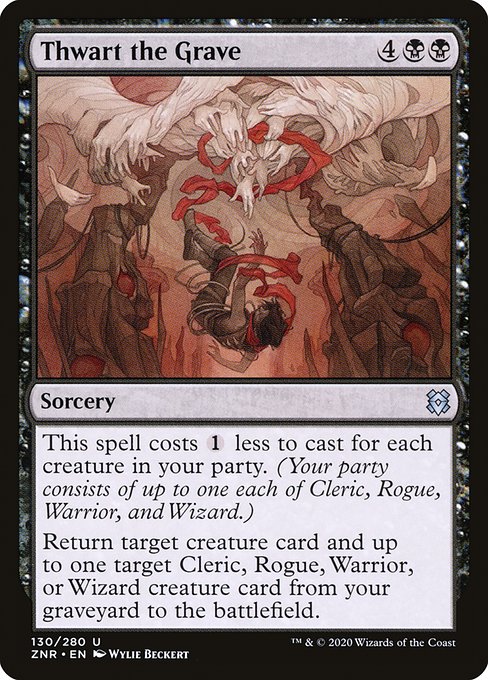

Clique pour retourner la carte
Scongiurare la Tomba
Stregoneria
Questa magia costa in meno per essere lanciata per ogni creatura nella tua compagnia. (La tua compagnia può includere fino a un Chierico, un Farabutto, un Guerriero e un Mago.)
Rimetti sul campo di battaglia una carta creatura bersaglio e fino a una carta creatura Chierico, Farabutto, Guerriero o Mago bersaglio dal tuo cimitero.
Rimetti sul campo di battaglia una carta creatura bersaglio e fino a una carta creatura Chierico, Farabutto, Guerriero o Mago bersaglio dal tuo cimitero.
standard
future
historic
gladiator
pioneer
explorer
modern
legacy
pauper
vintage
penny
commander
brawl
alchemy
paupercommander
duel
oldschool
premodern
Rulings
If a creature has more than one party creature type, and there are multiple ways to count that creature that could result in a different number of creatures in your party, the highest such number is used. For example, if you control a Cleric and a Cleric Wizard, the number of creatures in your party is two. You can't choose to have it be just one by counting the Cleric Wizard first as a Cleric.
Thwart the Grave's first target doesn't have to be one of the party creature types.
An ability referring to the number of creatures in your party gets a number from zero to four. Such abilities never ask which creatures are in your party, and you never have to designate specific creatures as being in your party. You can't choose to exclude creatures from this count to lower the number.
If a spell has a cost reduction based on the number of creatures in your party, no player may attempt to change that number after you begin to cast the spell but before you pay the cost.
To determine “the number of creatures in your party,” check whether you control a Cleric, whether you control a Rogue, whether you control a Warrior, and whether you control a Wizard. The number is the total number of those checks to which you answered yes. Each creature you control can be counted for only one of those checks.
Several cards have a cost reduction based on the number of creatures in your party. To determine the total cost of a spell, start with the mana cost or alternative cost you're paying, add any cost increases, then apply any cost reductions. The mana value of the spell is determined only by its mana cost, no matter what the total cost to cast the spell was.
Thwart the Grave's first target doesn't have to be one of the party creature types.
An ability referring to the number of creatures in your party gets a number from zero to four. Such abilities never ask which creatures are in your party, and you never have to designate specific creatures as being in your party. You can't choose to exclude creatures from this count to lower the number.
If a spell has a cost reduction based on the number of creatures in your party, no player may attempt to change that number after you begin to cast the spell but before you pay the cost.
To determine “the number of creatures in your party,” check whether you control a Cleric, whether you control a Rogue, whether you control a Warrior, and whether you control a Wizard. The number is the total number of those checks to which you answered yes. Each creature you control can be counted for only one of those checks.
Several cards have a cost reduction based on the number of creatures in your party. To determine the total cost of a spell, start with the mana cost or alternative cost you're paying, add any cost increases, then apply any cost reductions. The mana value of the spell is determined only by its mana cost, no matter what the total cost to cast the spell was.
Rulings
If a creature has more than one party creature type, and there are multiple ways to count that creature that could result in a different number of creatures in your party, the highest such number is used. For example, if you control a Cleric and a Cleric Wizard, the number of creatures in your party is two. You can't choose to have it be just one by counting the Cleric Wizard first as a Cleric.
Thwart the Grave's first target doesn't have to be one of the party creature types.
An ability referring to the number of creatures in your party gets a number from zero to four. Such abilities never ask which creatures are in your party, and you never have to designate specific creatures as being in your party. You can't choose to exclude creatures from this count to lower the number.
If a spell has a cost reduction based on the number of creatures in your party, no player may attempt to change that number after you begin to cast the spell but before you pay the cost.
To determine “the number of creatures in your party,” check whether you control a Cleric, whether you control a Rogue, whether you control a Warrior, and whether you control a Wizard. The number is the total number of those checks to which you answered yes. Each creature you control can be counted for only one of those checks.
Several cards have a cost reduction based on the number of creatures in your party. To determine the total cost of a spell, start with the mana cost or alternative cost you're paying, add any cost increases, then apply any cost reductions. The mana value of the spell is determined only by its mana cost, no matter what the total cost to cast the spell was.
Thwart the Grave's first target doesn't have to be one of the party creature types.
An ability referring to the number of creatures in your party gets a number from zero to four. Such abilities never ask which creatures are in your party, and you never have to designate specific creatures as being in your party. You can't choose to exclude creatures from this count to lower the number.
If a spell has a cost reduction based on the number of creatures in your party, no player may attempt to change that number after you begin to cast the spell but before you pay the cost.
To determine “the number of creatures in your party,” check whether you control a Cleric, whether you control a Rogue, whether you control a Warrior, and whether you control a Wizard. The number is the total number of those checks to which you answered yes. Each creature you control can be counted for only one of those checks.
Several cards have a cost reduction based on the number of creatures in your party. To determine the total cost of a spell, start with the mana cost or alternative cost you're paying, add any cost increases, then apply any cost reductions. The mana value of the spell is determined only by its mana cost, no matter what the total cost to cast the spell was.
Votre collection ? vos decks ?
Envie de gérer votre collection et/ou créer des decks ?
 0
0
 0.10€
0.10€
